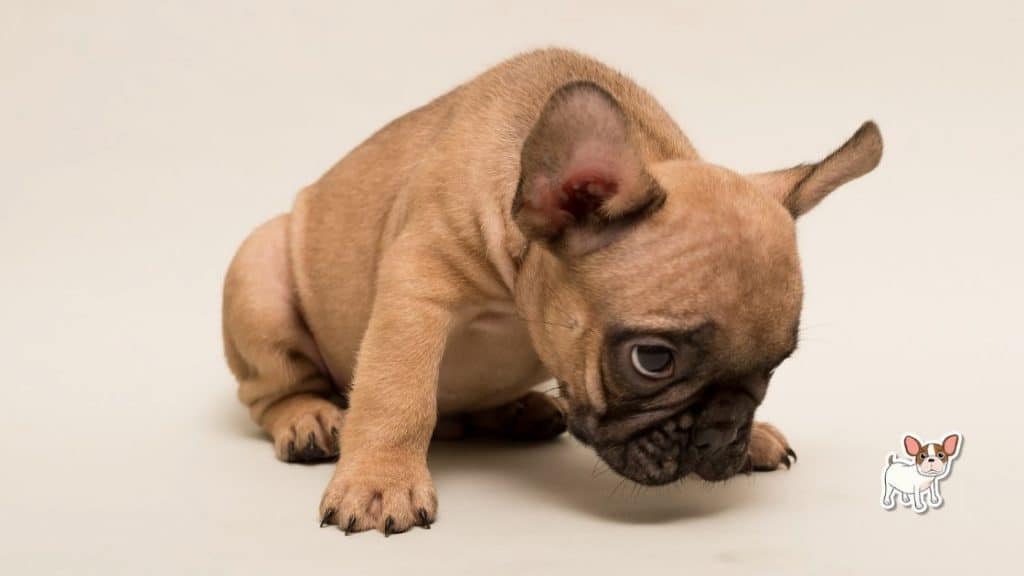The ears of a Frenchie are one of the more recognisable and beloved features. The large bat-ears add to an already characterful face, and the upright shape is very endearing. But, new owners will soon notice their pup’s ears beginning to curl backwards. What is the cause of this? Also, is this something that you need to correct or leave to correct itself with time?
The simple answer here is that they are curling backwards because this is what happens to all Frenchie puppies. Ears can become less erect as the body diverts calcium to the mouth during the teething process. Deal with the teething and be patient. Your pup’s ear will straighten out naturally in their own time.
Is it normal for a Frenchie’s ears to curl backwards?
It can be a little bit alarming for new Frenchie owners when they see their dog’s ears beginning to curl. Experienced owners will be aware that this is a completely natural occurrence and nothing to worry about. So, if this is your first pup, start by understanding that you are not alone and every Frenchie parent will deal with this to some degree. What is important is how you deal with the underlying causes of ear curling and that you are patient in waiting for them to correct themselves.
What causes French Bulldog ear tips to curl like this?
Interestingly, this ear curling is actually a knock-on effect of a completely different part of your pup’s growth and development. There is nothing wrong with the ears. Instead, the ears will curl and droop around the time that Frenchies start teething. Therefore, a noticeable change in the ears’ structure is a great indication of what is going on with your pup’s dental developments.
Focus on the teething rather than the shape of the ears.

Teething help
Instead of focusing on your pet’s ears and worrying about what is going on there, use this sign to pay more attention to your pet’s oral health and to watch out for teething issues. Your dog could go through some pain and discomfort during this period as their teeth come in.
They start with 28 baby teeth and will have these teeth if you buy them from a breeder at around 2 months old. At around 3 months old, their adult teeth will start to develop and push out the baby teeth. Furthermore, there are 42 of these adult teeth to come through. So, it is no surprise if your pup starts fussing.
Focus on providing care and relief for your pup to ease the pain of teething and help them through this period. It should only take a couple of months for the teeth to all come through, but that is still a long time dealing with discomfort. Teething rings and gels can help a lot. Frozen carrots can be a lifesaver for instant healthy teething option.
Also, remember that ear infections are a much bigger problem for Frenchies.
Puppy ear health
If you are concerned about your pup’s ear health, use this time to learn more about the risks of ear infections and how to clean a Frenchie’s ears correctly. Make sure to check them regularly for signs of blockages, discharges, or any other changes. Wipe them regularly but get professional help if you think that there is an infection. A dark discharge and bad smell are common signs.
Will their ears straighten out again?
Yes, the ears will eventually develop into the big bat-ear shape we expect from this breed. Once the teething process is over, and your pet is over that stage of their development, you should start to notice a change. On average, this will occur around the 4-month mark.

What can I do to help their ears straighten out?
The best thing that you can do is to let things develop naturally. Don’t get caught up in how your dog looks with these floppier ears or get too worried that the problem won’t correct itself. Sooner or later, the ears will become those erect bat-ears that you expect from a Frenchie.
Unfortunately, you will find other guides out there with conflicting advice on the matter. We urge you not to follow any guidance that involves taping or any other unnatural manipulation of the ears. There is a good chance that these owners value looks over health and don’t fully appreciate what is going on.

What if they haven’t straightened out after 6 months, is there a problem?
There is no fixed time frame for a Frenchie’s ear to become nice and erect. It will happen when it is meant to. So, this could mean that your dog ends up with floppy ears for longer than the average of 4 months. If they haven’t corrected themselves beyond 6 months, don’t worry about it too much, as long as your pet is healthy and active. If it is more than a year, or there are other signs of poor development, there could be an issue with calcium deficiency.
This is why the ears get so floppy around the time of teething. The dog’s body puts all the calcium resources into the teeth’ growth and development and diverts it from other areas, such as the cartilage in the ear. Once teething is over, levels should even out again as long as there is enough calcium in their diet. If the ears stay floppy and you have other concerns about their growth and development, you can talk to your vet about calcium supplementation. They can also help you with tips and products for teething.

In conclusion
In short, you have nothing to worry about when you notice your Frenchie’s ears curling backwards. This is completely normal and they will eventually become erect again after the teething process is over. Don’t focus your attention on how to “fix” this as there is nothing to worry about. Instead, focus on how you can make the teething process better for your pet.



